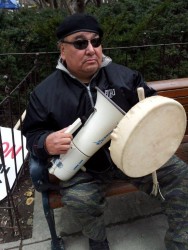Article Origin
Volume
Issue
Year
Two weeks after a ruling that the class action lawsuit known as the ‘Sixties Scoop’ was allowed to proceed, the federal government filed a notice of appeal.
On Dec. 2, 2014, the Ontario Superior Court dismissed an appeal by the federal government to halt the class action lawsuit. On Dec. 17, the appeal of that decision was in play.
“The federal Crown has sought leave to appeal the decision of the Ontario Superior Divisional Court to the Court of Appeal of Ontario,” reported Jeffery Wilson, lawyer for the Sixties Scoop survivors.
“The leave process is via written submissions from each party. We are presently preparing our submission. It will be another few months after we file our submissions before the Court of Appeal releases its decision. If leave or permission is granted for the appeal, it would be another year before the appeal is heard and decided. The test for leave is not particularly high. The Court of Appeal has to be satisfied that there is a public interest issue requiring its review.”
Cindy Blackstock, executive director of the First Nations Child and Family Caring Society of Canada, was not surprised by the federal government’s move.
“The government of Canada’s decision to appeal this decision, instead of doing right by Sixties Scoop survivors, is disappointing and sadly predictable,” said Blackstock. “It is consistent with the federal government position in the Canadian Human Rights Tribunal hearings on First Nations child welfare where they continue to deny or diminish mountains of evidence pointing to broad-based federal government discrimination in child welfare.”
Between 1965 and 1985, it is estimated that 16,000 Aboriginal children in Ontario were taken from their families by Children’s Aid representatives and placed in mostly non-Aboriginal homes. This is known as the ‘Sixties Scoop’. The lawsuit claims that these children were deprived of their cultural identity and because of that, have suffered devastating emotional, spiritual and psychological harm.
The Superior Court noted: “Here we are not dealing with just one aspect of that culture. Rather, we are dealing with a person’s connection to that culture as a whole. It is difficult to see a specific interest that could be of more importance to Aboriginal persons than each person’s essential connection to their Aboriginal heritage.”
Sixties Scoop survivor and well-known political activist John Fox, a member of Wikwemikong Unceded Indian Reserve on Manitoulin Island, was also not surprised that the federal government has filed a notice of appeal.
He said he is concerned with “the continued genocide of our families, of our children, of our parents. I think everything’s getting worse in this country for our people,” said Fox. “The whole Canadian system is based on oppression and genocide.”
Fox and his sister were taken from their parents by the CAS and placed in foster care when he was 12. Until he was 18, he was in non-Aboriginal homes in non-Aboriginal communities. He was living in a vacuum, he said, devoid of any contact with his sister, other family members, and his community and culture. It wasn’t until later, he said, that he reunited with his sister.
For Fox, a satisfactory outcome for the survivors means the government admits to its wrongdoing and makes restitution to the survivors. Many of the people who went through the child welfare system have perished, he said, and many of the remaining survivors, “suffer from homelessness; they’re isolated from their communities, they have no families, no language, no culture. Nothing. Absolutely nothing.”
Marcia Brown Martel, representative plaintiff for the lawsuit and chief of Beaverhouse First Nation, did not comment on the government’s notice of appeal. She spoke about the December court ruling and said, “I believe that the light is shining in the right direction as opposed to having gotten there. I believe that this is a milestone in the journey, but the majority of the trek is yet to come. It will definitely be a very fulfilling and worthwhile process to let the people of Canada know what has happened to people within the borders of Canada, and what they didn’t do to protect the children.”
Martel herself was taken from her family when she was a little girl and adopted into a non-Aboriginal family when she was nine.
Every person in every Aboriginal community across Canada has been affected by the Sixties Scoop, insisted Chief Brown Martel.
“One cannot live without their cousins, without their uncles and without their aunts.” The extended family was denied their traditional teaching role, and children were denied the knowledge about their culture, she said.
Owen Young, lawyer for the federal Department of Justice, did not respond to requests for an interview.
- 2823 views


